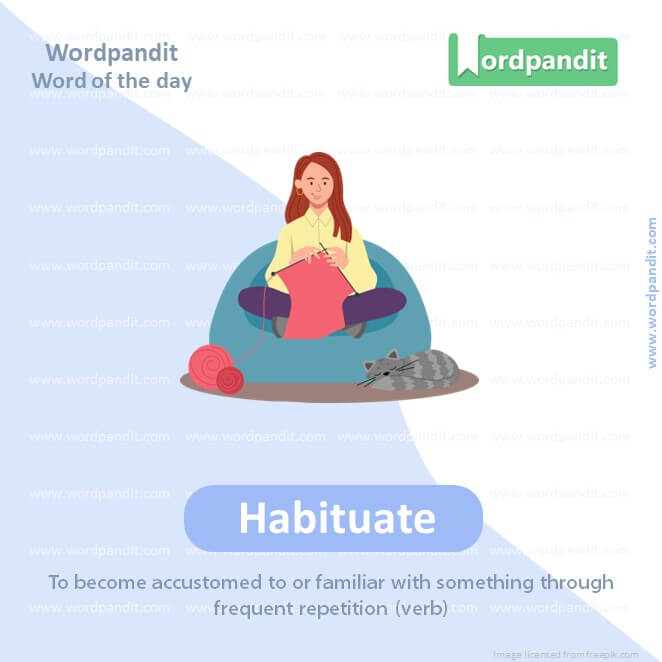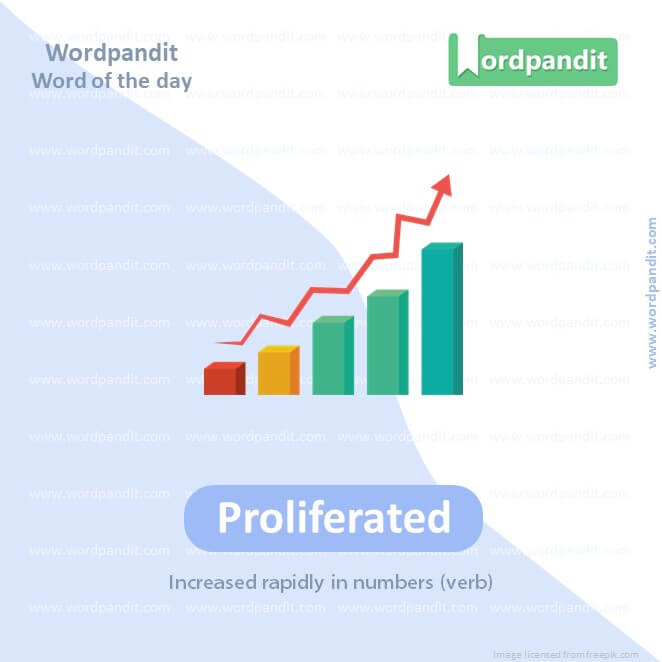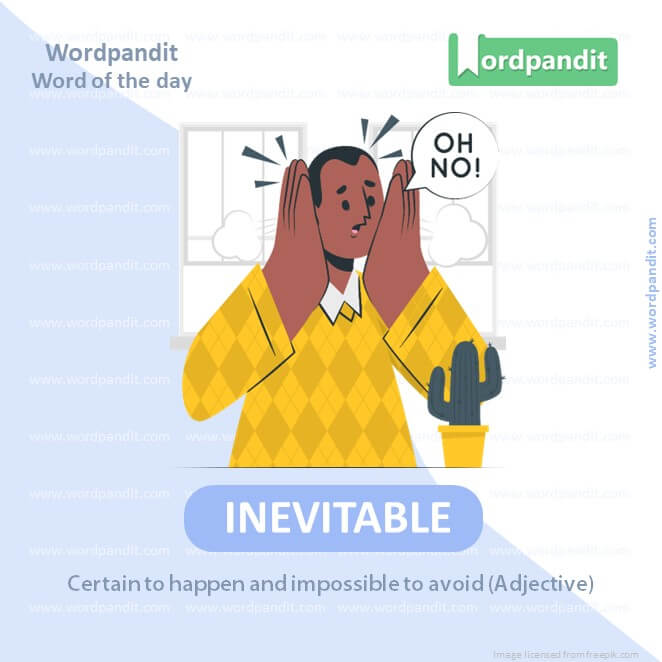Daily Vocabulary Words: List of Daily Used Words in Leading International Newspapers
Hi there. Welcome to this special section @ Wordpandit.
Our endeavour here is very simple: to highlight important daily vocabulary words, which you would come across in leading newspapers in the country. We have included the following newspapers in our selection:
• The New York Times
• The Washington Post
• Scientific American
• BBC
• The Guardian
• Psychology Today
• Wall Street Journal
• The Economist
We are putting in extensive work for developing your vocabulary. All you have got to do is be regular with this section and check out this post on a daily basis. This is your repository of words that are commonly used and essentially, we are posting a list of daily used words. Hence, this has significant practical application as it teaches you words that are used commonly in leading publications mentioned above.
Visit the website daily to learn words from leading international newspapers.

WORD-1: Demagogues
CONTEXT: At a time when conflict entrepreneurs (see: Tucker Carlson) and demagogues are trying to rip society apart, I’m beginning to think that these members of the managerial class, spread across the institutions of society, are serving as the invisible glue that gives us a shot at sticking together.
SOURCE: New York Times
EXPLANATORY PARAGRAPH: A demagogue is like a person who tries to get people excited or angry about something, often by saying things that might not be true or fair, just to get attention or power.
MEANING: Political leaders who seek support by appealing to popular
desires and prejudices rather than rational argument.
PRONUNCIATION: DEM-uh-gogs
SYNONYMS: Agitators, manipulators, populists, rabble-rousers, instigators, firebrands
USAGE EXAMPLES:
1. The crowd was swayed by the demagogue’s passionate speech.
2. The demagogues used fear to manipulate public opinion.
3. History is filled with demagogues who exploited people’s emotions for personal gain.
4. The demagogues’ tactics were divisive and harmful to society.
WORD-2: Crinkle
CONTEXT: When I was starting out at “PBS NewsHour” and I said something he thought was smart, his eyes would crinkle with pleasure.
SOURCE: New York Times
EXPLANATORY PARAGRAPH: When something gets wrinkled or makes a soft, rustling sound when you touch it, like crumpling a paper or walking on dry leaves, it’s called a “crinkle.”
MEANING: To wrinkle or make small, sharp, rustling sounds (verb); a small wrinkle or crease, or a rustling sound (noun).
PRONUNCIATION: KRIN-kuhl
SYNONYMS (VERB): Wrinkle, crease, ruffle, rumple, fold
SYNONYMS (NOUN): Wrinkle, crease, fold, crimp, rustle, ruffle
USAGE EXAMPLES:
1. She crinkled the paper in frustration.
2. The old book’s pages had started to crinkle.
3. The leaves crinkled underfoot as he walked through the forest.
4. The crinkle of the plastic bag alerted the cat to its treat.

WORD-3: Habituate
CONTEXT: The standards and moral ecology he helped create live on. Morally healthy communities habituate people to behave in certain ways and make it easier to be good.
SOURCE: New York Times
EXPLANATORY PARAGRAPH: When you do something so often that it becomes a habit, like brushing your teeth every morning, you “habituate” to it.
MEANING: To become accustomed to or familiar with something through frequent repetition (verb).
PRONUNCIATION: huh-BICH-oo-eyt
SYNONYMS: Accustom, familiarize, acclimate, adapt, condition, train
USAGE EXAMPLES:
1. It takes time to habituate to a new routine.
2. The residents habituated to the noise of the city.
3. Habituated behavior can be hard to change.
4. Habituation to exercise leads to improved fitness.
WORD-4: Self-centered
CONTEXT: They are not self-centered but cast the beam of their care on others, making them feel seen and lit up.
SOURCE: New York Times
EXPLANATORY PARAGRAPH: When someone mostly thinks about themselves and what they want, without considering others much, they are described as “self-centered.”
MEANING: Focused on oneself and one’s own interests or needs, often to the exclusion of others (adjective).
PRONUNCIATION: self-SEN-terd
SYNONYMS: Egocentric, selfish, narcissistic, self-absorbed, egotistical, self-indulgent
USAGE EXAMPLES:
1. His self-centered attitude made it hard for others to connect with him.
2. She was criticized for her self-centered behavior during the group project.
3. Self-centered individuals often struggle in collaborative environments.
4. The character’s self-centeredness was a central theme in the story.
WORD-5: Mentoring
CONTEXT: They do this mentoring with respect, not condescension. The most generative leaders don’t see themselves as doing things “for” people. They know that “with” is more powerful than “for.”
SOURCE: New York Times
EXPLANATORY PARAGRAPH: When someone helps and guides another person to learn or improve, like a teacher or a coach, they are “mentoring” them.
MEANING: Providing guidance, advice, and support to someone, especially in a professional or educational context (verb/noun).
PRONUNCIATION: MEN-tuh-ring
SYNONYMS (VERB): Coaching, advising, guiding, counseling, tutoring, supporting
SYNONYMS (NOUN): Guidance, coaching, support, counsel, tutelage, instruction
USAGE EXAMPLES:
1. She has been mentoring new employees to help them adjust to their roles.
2. The mentorship program pairs experienced professionals with mentees seeking career guidance.
3. Effective mentoring can significantly impact personal and professional growth.
4. He credits his success to the mentorship he received early in his career.

WORD-6: Applauding
CONTEXT: The incalculable value of every human life no matter how small — and the movement is now standing by or even applauding as Trump is turning the Republican Party into a pro-choice party, one more moderate than the Democrats, but pro-choice still.
SOURCE: New York Times
EXPLANATORY PARAGRAPH: When you clap your hands together to show that you like or appreciate something, like a good performance or a helpful gesture, you are “applauding.”
MEANING: Showing approval or praise by clapping hands (verb, present
participle).
PRONUNCIATION: uh-PLAW-ding
SYNONYMS: Praising, cheering, lauding, commending, acclaiming, congratulating
USAGE EXAMPLES:
1. The audience was applauding loudly after the musician’s performance.
2. We should be applauding efforts to protect the environment.
3. The teacher was applauding the students’ hard work and dedication.
4. He received an award for his applauding contributions to the community.
WORD-7: Nonetheless
CONTEXT: The baby’s life isn’t more important than the mother’s — which is why the best-drafted pro-life laws protect the life and physical health of the mother — but it possesses incalculable worth nonetheless.
SOURCE: New York Times
EXPLANATORY PARAGRAPH: Even if something else is true or happening, when you still want to say that the first thing is also true, you use the word “nonetheless.”
MEANING: In spite of that; nevertheless; however (adverb).
PRONUNCIATION: non-thuh-LES
SYNONYMS: Nevertheless, however, nonetheless, notwithstanding, still, yet
USAGE EXAMPLES:
1. She was tired; nonetheless, she continued to work on her project.
2. The weather was bad; nonetheless, they decided to go for a walk.
3. He wasn’t feeling well; nonetheless, he managed to finish the race.
4. The plan had its challenges; nonetheless, they were determined to succeed.

WORD-8: Proliferated
CONTEXT: I-generated imagery that often uses real people’s faces and identities — have proliferated online.
SOURCE: New York Times
EXPLANATORY PARAGRAPH: When something spreads and becomes more numerous or widespread, like how plants grow and multiply, it’s said to have “proliferated.”
MEANING: Increased rapidly in numbers (verb).
PRONUNCIATION: proh-LIF-uh-reyt-ed
SYNONYMS: Multiplied, expanded, grew rapidly, flourished, propagated, burgeoned
USAGE EXAMPLES:
1. Social media use has proliferated in recent years.
2. The species proliferated in the absence of predators.
3. Technology has proliferated across various industries.
4. Misinformation has proliferated online, causing confusion.

WORD-9: Inevitable
CONTEXT: What may seem inevitable to us in hindsight — the horrifying consequences of a country in political turmoil, given to violence and rived by slavery — came as a shock to many of the people living through it.
SOURCE: New York Times
EXPLANATORY PARAGRAPH: When something is bound to happen or cannot be avoided, like the sun rising every morning, it’s called “inevitable.”
MEANING: Certain to happen and impossible to avoid (Adjective)
PRONUNCIATION: in-EV-i-tuh-buhl
SYNONYMS: Unavoidable, inescapable, certain, destined, bound to happen, imminent
USAGE EXAMPLES:
1. Change is inevitable; we must adapt to it.
2. Despite their efforts, conflict seemed inevitable.
3. The consequences of climate change are inevitable without action.
4. Death is an inevitable part of life.
WORD-10: Delegitimized
CONTEXT: The film, written and directed by Alex Garland, presents a scenario in which the government is at war with breakaway states and the president has been, in the eyes of part of the country, delegitimized.
SOURCE: New York Times
EXPLANATORY PARAGRAPH: When something or someone loses its authority or validity, like if people stop believing in a leader or a rule, it’s “delegitimized.”
MEANING: Discredited or rendered illegitimate, often in terms of authority or validity (verb/adjective).
PRONUNCIATION: dih-li-JIT-uh-mized
SYNONYMS (VERB): Discredited, invalidated, undermined, nullified, questioned, challenged
SYNONYMS (ADJECTIVE): Discredited, invalidated, illegitimate, questioned, undermined, nullified
USAGE EXAMPLES:
1. The scandal delegitimized the government’s authority.
2. His erratic behavior delegitimized his leadership position.
3. The court ruling delegitimized the company’s claims.
4. Delegitimized claims often lead to distrust and skepticism.
Vocabulary Meaning and Examples
In the fascinating world of language learning, a method particularly impactful is learning ‘vocabulary meaning and examples’. Harnessing this dual approach of understanding words through definitions and relevant examples yields a sound vocabulary grasp. Let’s explore how we can effectively learn vocabulary using ‘meaning and examples’.
Foremost, recognizing ‘meaning and examples’ involves more than just a surface glance at the definition. It requires an engaged interaction with the word, placing it within a proper context. This enriches comprehension and facilitates an innate understanding of the word’s applications.
The process of learning ‘meaning and examples’ is made highly effective through varied resources. Reading literature, online articles, and language learning platforms offer numerous examples enriching the meanings. By frequently encountering a word in various contexts, the understanding of the ‘meaning and examples’ deepens, imprinting the word into long-term memory.
When learning ‘meaning and examples’, creating personal sentences is recommended. Develop your own examples using the given word. This personal connection between learned vocabulary and your everyday life context strengthens both familiarity and recall.
Moreover, taking notes while studying ‘meaning and examples’ goes a long way in mastering vocabulary. Jotting down the definition and a couple of examples for reference leads to better recall during revisions.
Finally, teach to learn. A tried-and-true method to solidify ‘meaning and examples’ is by explaining the word to someone else. This exercise forces you to articulate the word’s usage and understanding clearly, embedding it further in your memory.
In conclusion, the journey to learn ‘vocabulary meaning and examples’ is a rewarding process that involves a multifaceted approach. As you dive into the rich experience of understanding words through ‘meaning and examples’, you uncover the nuance and depth of language, enabling you to master it in its true sense.











